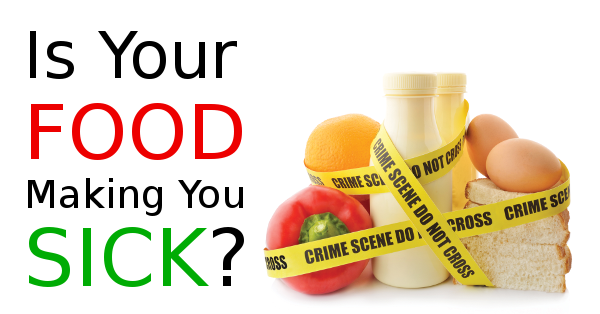You’re careful about your health. You do your best to eat well, and you pay attention to the ways that your diet affects your energy levels. But something seems off. You’re experiencing annoying symptoms that you can’t explain. You’re often gassy and bloated, your skin may not be clear and glowing anymore, you may be ready for a nap after a meal and you wish you could remember where you put your keys. Why does your memory feel so foggy?
These issues are frustrating (and often embarrassing). They’re also very common. Many patients come to see us with healthy lifestyles, but are baffled by continuing digestive issues, mysterious rashes, and low energy levels. If this sounds familiar, it may be time to take a good look at your diet. Even a “healthy” food can make you sick if your body is intolerant to it. For many, the food mystery becomes both frustrating and overwhelming when trying to understand what foods are nourishing you and not making you feel terrible.
But the good news is that you may not have to look very far to make changes that relieve your symptoms. With a bit of detective work, and a bit of help, you can map out a dietary plan that restores your wellbeing.
What are the Symptoms of Food Sensitivities?
Food sensitivity can be very tricky to diagnose. One reason is that there’s no one-size-fits-all description of the way our bodies react and diagnostic approaches vary. Symptoms vary from person to person and can even be different depending on what else is happening in your body. For example, you might respond differently at different stages of your menstrual cycle. Additionally, your body may be reacting to common chemical compounds (for example, glyphosate) known to be present in high quantities in certain commercially prepared foods.
Food sensitivities can cause:
- Gas
- Bloating
- Bowel problems
- Asthma
- Chronic illness
- Sinus infections
- Autoimmune diseases
- Sore joints
- Migraines
- Dark circles under your eyes
- Brain fog - that annoying forgetfulness and lack of clarity
- Eczema and psoriasis
- Many other conditions!
Another reason why food sensitivity is often a missed diagnosis is that these symptoms can be delayed up to or more than 24 hours after a meal, so many people don’t make the connection between what they ate and how they feel.
Similarly, it’s difficult to measure how many people suffer from food sensitivities because a lot of us don’t seek medical help, figuring that it’s “normal” to feel gassy and tired all of the time. In fact, many doctors are skeptical about food sensitivities, which can lead to frustration for patients. Once your doctor has carefully considered other related disease through diagnostic testing, it may be time to consider food sensitivities.
What Causes Food Sensitivities?
It’s important to recognize the difference between food allergies, food intolerances, and food sensitivities. Food allergies are immune reactions. After eating a certain food, your body’s immune system launches an attack by making its own protein, called immunoglobulin E (IgE). The next time you consume that food, your body is ready to attack again. The IgE causes your body to release a chemical called histamine, which triggers the physical symptoms of an allergic reaction. This is the type of allergy reaction one has to pollens and dander. With food, it can cause frightening anaphylaxis reactions.
A food intolerance occurs when the body loses the ability to produce a certain digestive enzyme. Lactose intolerance occurs when the body cannot produce the lactase enzyme, and fructose intolerance occurs when a body cannot produce the fructase enzyme. Eating foods with lactose or fructose will then cause gas/bloating and diarrhea to occur.
A food sensitivity reaction occurs when you eat a food and it forms an antigen/antibody reaction. That is, a different part of your immune system binds to the food, the IgG reaction. Those immune complexes can cause intestinal and systemic inflammation by a process loosely known as “leaky gut” syndrome.
My colleagues and I have been evaluating food related illness in selected patients for decades and have offered valued advise by shedding light on their health as part of a collective of presenting signs and symptoms, assessment tools, and diagnostic tests.
What is the root cause of food sensitivities? And why are they becoming increasingly common?
There are many medical reasons:
- Eating the same food over and over: the gut loves variety and is healthiest when many different foods are eaten regularly. Simply eating cheese, wheat and eggs all the time increases the risk that you might develop a sensitivity to one of them.
- Antibiotics and other drugs that harm the gut: many medications can harm the gut, the ability to digest, the beneficial bacteria in our intestines. Proton Pump Inhibitors and common anti-inflammatories, such as ibuprofen and naproxen are damage the gut as well.
- Poor diet: A diet high in processed foods, sugar, chemicals, Genetically modified organisms, too much coffee or alcohol—all these things can over time increase irritation causing inflammation of the gut lining and increasing the risk of developing a food sensitivity.
- Lack of protective nutrients: Ingesting foods high in antioxidants and anti-inflammatory chemicals help protect all cells in your body, including your intestinal lining.
- Dysbiosis: When you have low beneficial bacteria or an overgrowth of problematic fungal or bacteria species, this can cause “leaky gut” and food sensitivities.
- Eating too fast, eating too much: Poor eating habits can limit the body’s inherent capacity for proper digestion.
Which Foods Can Cause Food Sensitivities?
Uncovering food sensitivities is a fantastic reason why seeing a medical professional is a good idea if you suspect your food may be making you sick. In addition, medical supervision can ensure your approach to food remains healthy and balanced. Research suggests that food sensitivities can be a trigger for disordered eating in some people. After all, if food is causing you pain, but you’re not sure which foods are to blame, it’s easy to associate your diet with negative experiences. We don’t want you to limit your diet without sound reason and cause further food related illness or nutrient deficiencies.
To your best health!
Dr. Amita Sachdev BScN, (RN), ND
Disclaimer
The advice provided in this article is for informational purposes only. It is meant to augment and not replace consultation with a licensed health care provider. Consultation with a Naturopathic Doctor or other primary care provider is recommended for anyone suffering from a health problem.
__________________________________________________________
References
https://www.ncbi.nlm.nih.gov/pubmed/28936357
https://www.ncbi.nlm.nih.gov/pmc/articles/PMC5603184/
https://www.sciencedirect.com/science/article/abs/pii/S0277953608002773
https://www.ncbi.nlm.nih.gov/pubmed/7460264
https://www.nature.com/articles/s41575-018-0064-z
https://www.sciencedirect.com/science/article/pii/S0306453018303950
https://my.clevelandclinic.org/health/diseases/10009-food-problems-is-it-an-allergy-or-sensitivity


